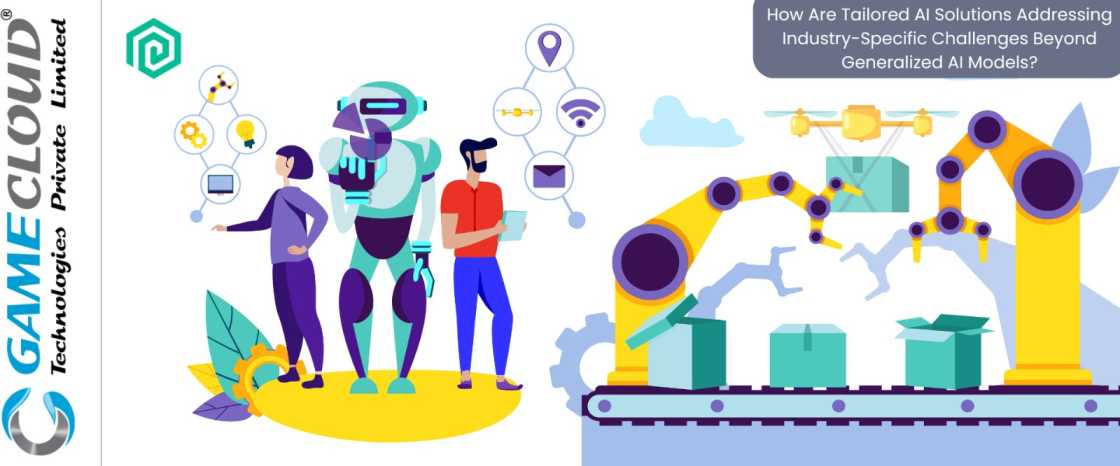
AI has fundamentally transformed how businesses operate and innovate. While generalized AI models, like GPT-4, are celebrated for their versatility, they often fall short in addressing specific, nuanced challenges faced by various industries. This has paved the way for tailored AI solutions—customized systems designed to meet the unique demands of specific fields.
Limitations of Generalized AI Models
Generalized AI models are trained on vast datasets encompassing diverse topics, enabling them to perform various tasks reasonably well. However, this broad approach can dilute their effectiveness in specialized contexts. For instance, in healthcare, generalized models might fail to recognize intricate medical terminologies or deliver context-specific recommendations. Similarly, in finance, they may overlook critical nuances of compliance regulations or transaction patterns.
Another key limitation is the occurrence of inaccuracies, often referred to as “hallucinations,” where the model generates plausible but incorrect information. This issue can have serious repercussions in sectors requiring precision, such as legal services or aviation. These limitations underscore the need for AI systems that are specifically designed and fine-tuned for individual industries.
Why Tailored AI Solutions Are Better
Tailored AI solutions are purpose-built to address the complexities and unique demands of specific industries. Unlike generalized AI, they focus on delivering accuracy and relevance by being trained on industry-specific data. This specialization allows them to solve problems more effectively while offering actionable insights.
In the healthcare sector, for example, tailored AI is revolutionizing diagnostics by analyzing medical images with exceptional accuracy, aiding early disease detection. In agriculture, AI-driven systems optimize crop management by analyzing environmental factors and predicting yields. These specialized systems provide businesses with tools that align closely with their operational requirements, resulting in better outcomes.
Moreover, tailored AI solutions can seamlessly integrate into existing processes, reducing inefficiencies and enabling organizations to innovate faster. This adaptability ensures that businesses remain agile and competitive in their respective markets.
Real-World Applications and Benefits
Across industries, tailored AI solutions are driving innovation. In manufacturing, predictive maintenance systems use AI to monitor equipment, identifying potential failures before they occur. This minimizes downtime and improves operational efficiency. Retailers are leveraging tailored AI for demand forecasting, ensuring optimal inventory levels and reducing waste.
One of the standout benefits of these specialized systems is their ability to offer actionable precision. By being trained on specific datasets, tailored AI solutions provide insights that are far more relevant and applicable than those offered by generalized models. This level of precision not only enhances decision-making but also improves customer satisfaction and loyalty.
Challenges of Adopting Tailored AI
Despite their advantages, implementing tailored AI solutions is not without challenges. One major hurdle is the need for high-quality, industry-specific data. Collecting and curating this data requires significant time and resources. Additionally, integrating tailored AI into existing systems can be complex, demanding careful planning and execution.
Another concern is ensuring compliance with industry regulations and ethical standards. Tailored AI systems must be designed to meet these requirements, which often involves continuous monitoring and updates. However, addressing these challenges is critical to unlocking the full potential of tailored AI.
Transforming Ideas into Reality with Ankatmak’s Tailored AI Solutions
Ankatmak, an independent division of GameCloud Technologies, specializes in providing innovative AI solutions and IT consultancy for diverse industries. With expertise spanning custom AI, software development, and digital transformation, we focus on creating tailored, cost-effective solutions. Our commitment to excellence ensures that you pay only when satisfied with our services. Backed by over a decade of experience from GameCloud, we are dedicated to helping businesses navigate the complexities of technology with precision and creativity. Let us be your trusted partner in transforming ideas into reality.
Conclusion
While generalized AI models have demonstrated remarkable capabilities, their limitations in addressing industry-specific challenges highlight the growing importance of tailored AI solutions. By focusing on precision, relevance, and adaptability, tailored AI systems provide businesses with tools to solve complex problems and remain competitive.
As industries continue to evolve, the adoption of tailored AI solutions is becoming essential. These systems not only help organizations overcome their unique challenges but also position them for long-term success in an increasingly competitive and technology-driven world. Tailored AI is more than a trend—it is the future of industry-specific innovation.
For Know More Contact-Now
FAQ: How Are Tailored AI Solutions Addressing Industry-Specific Challenges Beyond Generalized AI Models?
What are the main limitations of generalized AI models like GPT-4 in industry-specific applications?
Generalized AI models, while versatile, often fail to address specialized needs. They may lack understanding of complex terminologies, miss regulatory nuances, or generate inaccurate information in fields like healthcare, finance, or legal services where precision is critical.
How do tailored AI solutions differ from generalized AI models?
Tailored AI solutions are customized for specific industries and trained on domain-specific data. This allows them to provide accurate, actionable insights and address unique challenges, unlike generalized models that rely on broad datasets and may lack context-specific relevance.
What are some real-world applications of tailored AI solutions?
Tailored AI solutions are used in various industries. Examples include diagnostic tools in healthcare, predictive maintenance in manufacturing, demand forecasting in retail, and crop management optimization in agriculture. These applications enhance efficiency, decision-making, and customer satisfaction.
What challenges are associated with adopting tailored AI solutions?
Key challenges include sourcing high-quality, industry-specific data, integrating AI systems into existing workflows, and ensuring compliance with regulations and ethical standards. Overcoming these hurdles requires careful planning, monitoring, and investment in data infrastructure.
